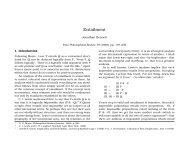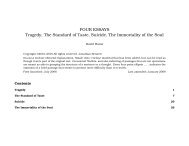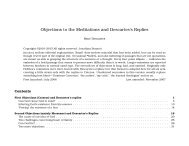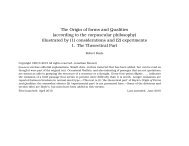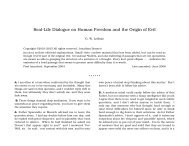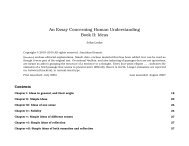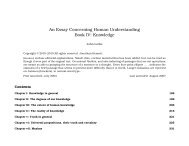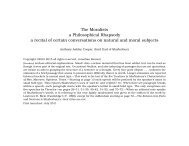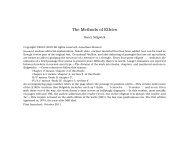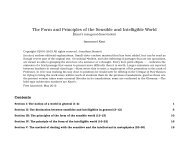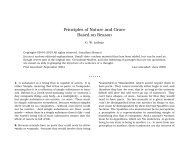A Vindication of the Rights of Woman with - Early Modern Texts
A Vindication of the Rights of Woman with - Early Modern Texts
A Vindication of the Rights of Woman with - Early Modern Texts
Create successful ePaper yourself
Turn your PDF publications into a flip-book with our unique Google optimized e-Paper software.
The <strong>Rights</strong> <strong>of</strong> <strong>Woman</strong> Mary Wollstonecraft 5: Pity bordering on contempt<br />
<strong>of</strong> that care is different. In <strong>the</strong> male sex it is <strong>the</strong> development<br />
<strong>of</strong> bodily powers; in <strong>the</strong> female sex, <strong>the</strong> development <strong>of</strong><br />
personal charms. I’m not saying that ei<strong>the</strong>r strength or<br />
beauty should be confined exclusively to one sex, but only<br />
that <strong>the</strong> priorities for <strong>the</strong>m should be reversed in <strong>the</strong> two<br />
sexes. Women certainly need enough strength to be able to<br />
move and act gracefully, and men need enough address [see<br />
Glossary] to be able to act <strong>with</strong> ease.<br />
* * *<br />
[A paragraph about <strong>the</strong> kinds <strong>of</strong> play that children like: tops,<br />
drums, and carts for one sex, mirrors, trinkets and dolls for<br />
<strong>the</strong> o<strong>the</strong>r.]<br />
* * *<br />
Here <strong>the</strong>n we see a basic propensity firmly established; all<br />
you ·as a parent· need to do is to go <strong>with</strong> it and regulate it.<br />
The little girl will doubtless want to know how to dress up<br />
her doll, to make its sleeve knots, its flounces, its head-dress,<br />
etc. She needs a lot <strong>of</strong> help from members <strong>of</strong> <strong>the</strong> household;<br />
so much help that it would be much more agreeable to her<br />
to do all this for herself. That provides a good reason for <strong>the</strong><br />
first lessons that are usually taught to <strong>the</strong>se young females:<br />
in which we seem not to be setting <strong>the</strong>m a task but doing<br />
<strong>the</strong>m a favour by instructing <strong>the</strong>m in something immediately<br />
useful to <strong>the</strong>mselves. They nearly all learn <strong>with</strong> reluctance<br />
to read and write, but <strong>the</strong>y very readily apply <strong>the</strong>mselves to<br />
<strong>the</strong> use <strong>of</strong> <strong>the</strong>ir needles. They imagine <strong>the</strong>mselves already<br />
grown up, and think <strong>with</strong> pleasure that such qualifications<br />
will enable <strong>the</strong>m to decorate <strong>the</strong>mselves.<br />
·WOLLSTONECRAFT·<br />
This is certainly an education only <strong>of</strong> <strong>the</strong> body; but Rousseau<br />
isn’t <strong>the</strong> only man who has indirectly said that merely<br />
55<br />
<strong>the</strong> person [see Glossary] <strong>of</strong> a young woman—<strong>with</strong>out any<br />
mind. . . .—is very pleasing. To make it weak and what<br />
some may call ‘beautiful’, <strong>the</strong> understanding is neglected<br />
and girls are forced to sit still, play <strong>with</strong> dolls, and listen<br />
to foolish conversations; <strong>the</strong> effect <strong>of</strong> •habit is insisted on<br />
as an undoubted indication <strong>of</strong> •nature. I know it was<br />
Rousseau’s opinion that <strong>the</strong> first years <strong>of</strong> youth should be<br />
employed in forming <strong>the</strong> body, though in educating Émile<br />
he deviates from this plan. But <strong>the</strong> body-streng<strong>the</strong>ning on<br />
which strength <strong>of</strong> mind largely depends is very different from<br />
<strong>the</strong> body-streng<strong>the</strong>ning that enables <strong>the</strong> person to move<br />
easily.<br />
Rousseau’s observations. . . .were made in a country<br />
where <strong>the</strong> art <strong>of</strong> pleasing. . .<br />
how MW went on: . . . was refined only to extract <strong>the</strong> grossness<br />
<strong>of</strong> vice. He did not go back to nature, or his ruling<br />
appetite disturbed <strong>the</strong> operations <strong>of</strong> reason, else he would<br />
not have drawn <strong>the</strong>se crude inferences.<br />
what she seems to have meant: . . . was developed only so<br />
as to make vice [see Glossary] more elegant. He wouldn’t<br />
have drawn <strong>the</strong>se crude conclusions if he had gone back<br />
to nature and his thinking about it hadn’t been disturbed by<br />
his dominating sex-drive.<br />
In France boys and (especially) girls are educated only to<br />
please, to manage <strong>the</strong>ir persons, and regulate <strong>the</strong>ir exterior<br />
behaviour; and <strong>the</strong>ir minds are damaged at an early age<br />
by <strong>the</strong> cautions—some worldly, some pious—that <strong>the</strong>y are<br />
given to guard <strong>the</strong>m against immodesty. In past times, <strong>the</strong><br />
confessions that mere children were obliged to make, and<br />
<strong>the</strong> questions asked by <strong>the</strong> confessors (I have good authority<br />
for this), were enough to impress a sexual character—·i.e.<br />
to reinforce <strong>the</strong> society’s idea <strong>of</strong> femininity in <strong>the</strong> girls,<br />
and its idea <strong>of</strong> masculinity in <strong>the</strong> boys·. The education



